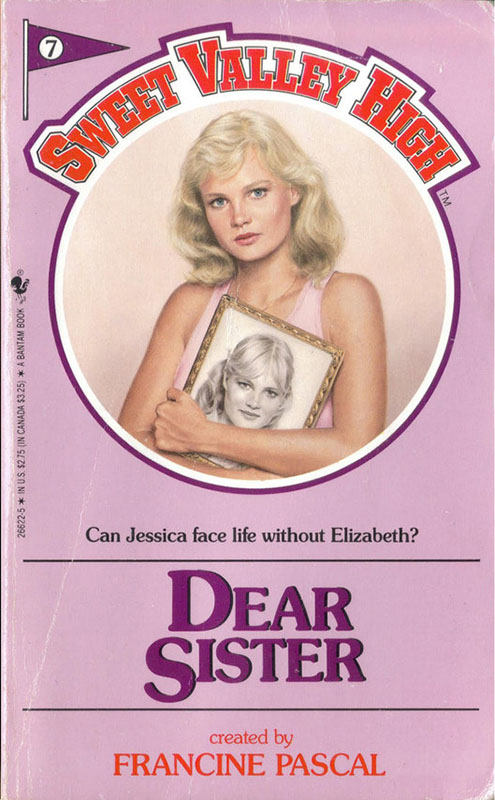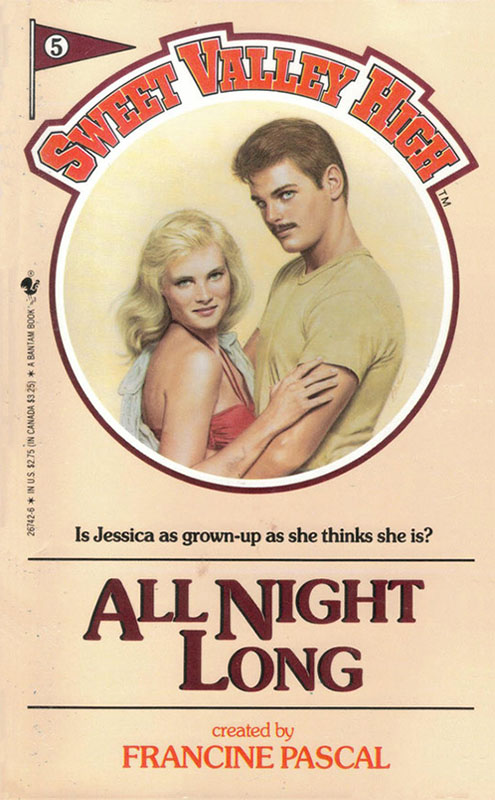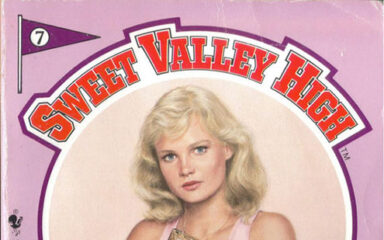
Late Gen Xers and Xellenials are having a lot to talk about right now, and the rapid-onset nostalgia is strong.
Rapid-onset nostalgia (must credit Caperton) is that particular form of nostalgia that arises with the passing of a particular kind of public person. It’s not nostalgia for that person, as the feeling that arose when we lost Betty White or Alan Rickman. It’s nostalgia for what they created. It’s, “Oh, So-and-so died. Do you remember that show? My favorite episode was…”
For this round, it’s the passing of Francine Pascal on Sunday. And if that name rings no bells, or rings only faint, distant ones, that’s not surprising — she wasn’t hugely well known in and of herself (despite her doing so very much stuff in her 92 years on earth, it turns out). But if you were alive and cognizant during the mid- to late eighties (and onward for a good two decades, really), you probably had at least some awareness of the Sweet Valley High series of tween-targeted books. You might have even have some vague memory of a Jessica and an Elizabeth, who were blonde and blue-eyed with “perfect” size-6 figures and a red Fiat Spider, all of which was noted specifically in every single book.
(Fun[?] fact: When the series was revamped and re-issued for a more modern audience in 2008, those “perfect” figures had been slimmed down to a size 4. Like, for real, it was important that damage to young girls’ body image not get lost in the modernizing revisions.)
But see? There it is. The death of Francine Pascal raises essentially no memories of the woman herself. It’s the thing she created that’s living on.
Dear Sisters
Now, I wasn’t actually a huge Sweet Valley High fan. (I was a Baby-Sitters Club devotee, until my Horse Girl phase hit and I transitioned to the Saddle Club.) But I read the books on occasion, and it was basically part of the lexicon among my extended social group for a time. We all knew if we were a Jessica or an Elizabeth. (I think pretty much all of us thought we were a Jessica but were really an Elizabeth because we were 11 and hardly had access to any of her Jessical shenanigans.) I picked them up from the library from time to time, and at sleepovers, I’d sometimes see one on a friend’s bookshelf and read it while everyone else was going to sleep (I’m sure you’re shocked to discover I was that kind of kid). It was almost a minor analog of the Barbie craze — even if you didn’t have any of the books yourself, you were living in their aura.
My gateway SVH book was Dear Sister. In that book [SPOILER ALERT], Elizabeth was in a coma following a motorcycle accident with her boyfriend, Todd, and when she awoke, her personality was completely different and she’d basically become (a way bitchier version of) Jessica. And as the story progressed, and Elizabeth started doing daring things and alienating her Elizabethan friend group, Jessica found herself taking on more and more of the Elizabeth role. (All of this was complicated, as you might expect, by the fact that the girls were physically identical as these personality shifts were occurring.) Elizabeth even got into a fight with Todd over something, I don’t remember, and ended up going on a date with the massively rich and skeezy Bruce Patman at his beach house, and he got her drunk and she fell and hit her head on the coffee table and when she came to, she was Elizabeth again. Upon discovering this, Bruce tried to sexually assault her, in a tween book, remember and she’s running away and onto the beach and straight into Todd’s arms, because he was on the beach for some reason, and some other stuff was going on with Jessica, and then they lived happily ever after until whatever happened in the next book.
If you noticed the “I don’t remember” and the “for some reason,” it’s because I was just recapping the book COMPLETELY FROM MEMORY A GOOD THREE DECADES AFTER I READ IT. THAT’S WHAT THESE BOOKS ARE.
Dear Lord

And note I didn’t say they were good, just that they were there. There was body shaming and body image pressure, just starting with the “perfect size 6” in every single book. The SVH universe was overwhelmingly white, with a nice touch of racism where appropriate (and I’m not in the “we have to overlook it, because it was of the time” crowd, so there’s that). The portrayals of dating and sexuality and all the things definitely didn’t promote a healthy message for impressionable girls. And the scene in Dear Sister where Elizabeth’s neurosurgeon had to take a minute to scam on Jessica before moving on to her sister’s medical condition? In retrospect, it could have used a quick, “Seriously, are you hitting on me while my sister is lying in a coma?” before progressing to the rest of the plot.
So this isn’t a the series was influential and we have to overlook the problematic parts post, and it’s not a the series was influential and we’ll just excuse the problematic parts post — it’s problematic parts and all, the series was influential.
Sara at Smart Bitches Trashy Books discusses the impact the series had on her life, including its place on the teen-romance-to-V.C.-Andrews pipeline, and the impact of those problematic aspects — she, like I, gives no passes for said aspects — and wrapped it up into a quoteworthy conclusion:
The “compellingly ridiculous,” as I called them in that [SBTB podcast] episode [linked in the original post], world of Sweet Valley influenced me in ways I’ll probably keep discovering as I look back at my reading history and the genres I love. I often joke about moments when my inner 13 year old is NOT CHILL, and Sweet Valley was what my 13 year old self was reading as fast as she could. They formed a piece of the foundation of my adult self, which is no small feat.
(Read the whole post, please.)
And the thing about rapid-onset nostalgia is that isn’t wholly about the producer, but to a degree, it isn’t even entirely about the produced. It’s about the era, and the mental return thereto. That’s why actually having consumed the books en masse isn’t necessary to participate in the nostalgia — because everyone’s been 13, and now everyone’s nostalgiafying about their 13-year-old-hood, regardless of their reading habits at the time. When you’re talking about what you were and weren’t doing at that age, and what you’d wished you were doing (because pretty much every 13-year-old wishes they were doing something else, right?), and what you were reading, whether or not it was SVH, and where your life went after that. Discussion of the books becomes like a writing prompt or an improv suggestion — a jumping-off point to keep going with your own thing.
Dear Francine
And one of the really interesting things about this whole situation is that the vast majority of the SVH books and spinoffs weren’t written by Francine Pascal. She created and meticulously outlined and frameworked the whole thing, and she wrote the first dozen or so books, but the vast majority of the corpus — in the area of 150 books, IIRC, and a ton of spinoffs — was written by ghostwriters. So not only does her passing trigger nostalgia over a thing she created, it triggered nostalgia over something even larger — much larger — than what she created, among a crowd rather larger than she created it for.
So here’s to Francine Pascal for… I don’t even really know, even. For putting so much energy into creating something for tween girls to embrace, thus setting up a wide-ranging domino course and knocking the first one over. And giving me an opportunity to think back on that scene in Dear Sister where 13-year-old me was scandalized by the word “breast.” May you drive your red Fiat Spider into an eternal California sunset.

